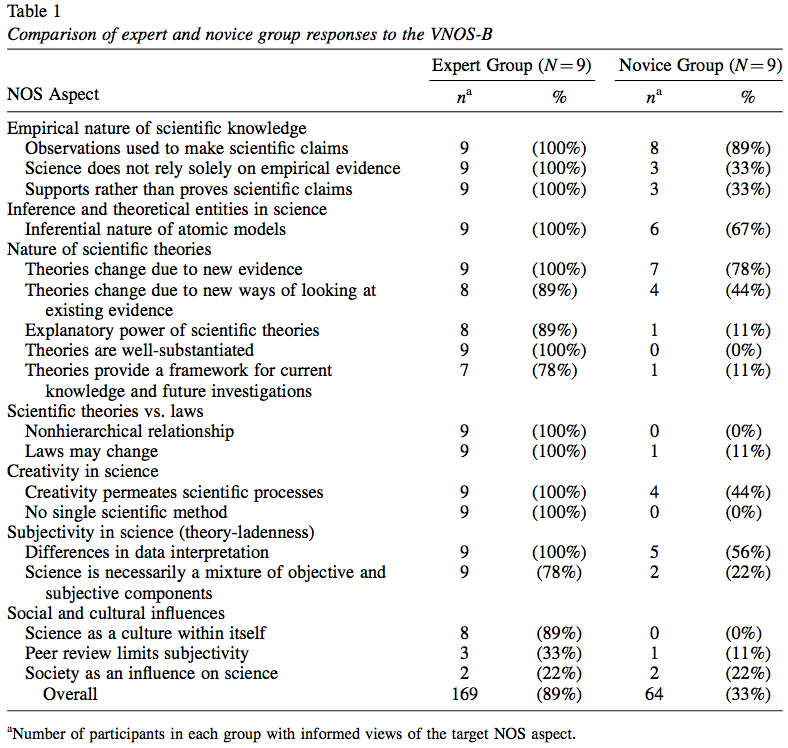Developed by Norman G. Lederman, Fouad Abd-El-Khalick, Randy L. Bell, Renee S. Schwartz, Judith Lederman, Eun Kyung Ko
| Purpose | To elucidate students’ views about several aspects of the nature of science. |
|---|---|
| Format | Short answer |
| Duration | 60 min |
| Focus | Beliefs / Attitudes (nature of science, theories and laws, tentativeness, creativity, objectivity, subjectivity, social and cultural influences) |
| Level | Intro college, High school, Middle school |
Sample question from the VNOS:
Scientists produce scientific knowledge. Do you think this knowledge may change in the future? Explain your answer and give an example.
In order to predict the weather, weather persons collect different types of information. Often they produce computer models of different weather patterns. (a) Do you think weather persons are certain (sure) about the computer models of the weather patterns? (b) Why or Why not?
more details
This is the second highest level of research validation, corresponding to at least 5 of the validation categories below.
Research Validation Summary
Based on Research Into:
- Student thinking
Studied Using:
- Student interviews
- Expert review
- Appropriate statistical analysis
Research Conducted:
- At multiple institutions
- By multiple research groups
- Peer-reviewed publication
The open-ended questions on the VNOS were created by the developers and an initial version (A) was tested in student interviews to ensure that students interpreted the questions in the way intended. The questions were revised to create version B and tested in another set of student interviews. Version B was tested with experts and novices and the developers found that experts scored much higher than novices, as expected. Version B was further modified to create version C, which then underwent expert review. Version D+ is shorter version that provides the same data as VNOS-C, which is very long. This version was developed from focus groups of teachers in Project ICAN, which was using VNOS-C. The VNOS was administered to undergraduates and graduates, and pre-service teachers. The VNOS has been given to over 2000 students and results are published in over peer-reviewed 9 publications.
References
- N. Lederman, F. Abd-El-Khalick, R. Bell, and R. Schwartz, Views of Nature of Science Questionnaire: Toward Valid and Meaningful Assessment of Learners’ Conceptions of Nature of Science, J. Res. Sci. Teaching 39 (6), 497 (2002).
We don't have any translations of this assessment yet.
If you know of a translation that we don't have yet, or if you would like to translate this assessment, please contact us!
Download the VNOS answer key.
| Typical Results |
|---|
Typical results for the VNOS (from Lederman 2002):
Instructors should not expect students to score well on the VNOS unless there is an explicit attempt to teach ideas around the nature of science. |
The latest version of the VNOS, released in 2010, is version D+ and was developed by Norman G. Lederman and Judith Lederman. Version D+ is a modification of version C (1998, developed by Norman G. Lederman, Randy Bell, Fouad Abd-El-Khalick, and Renee Schwartz). Version D+ is shorter and easier for students to complete in 60 minutes. Version C is a modification and expansion of version B (1990, developed by Norman G. Lederman and Randy Bell). Version B added item 3, modified items 1, 2, 5, and 7, and added five new items. Version B is a revision of version A (1990, developed by Norman G. Lederman). There is also a version E of the VNOS that was created for elementary students (developed by Judith Lederman and Eun Kyung Ko).





